Newsbeat's guide to... The Arab League
- Published

The Arab League is a voluntary group of 22 Arabic speaking countries
The Arab League says it is concerned about the ongoing violence in Syria after ending a monitoring mission inside the country.
The group of 22 Arabic speaking countries say the only plan is for Syrian President Bashar al-Assad to step down and let his deputy form a national unity government with the opposition.
However, that has been rejected by Syria as "blatant interference".
This week Russia and China have vetoed a Western-backed UN resolution criticising the crackdown in the country.
Protests have been going on in the Middle Eastern country since March 2011. It's claimed more than 5,000 people have died.
Who are the Arab League?
The Arab League is a voluntary group made up of 22 countries where Arabic is either the main or official language.
These include Algeria, Bahrain, Egypt, Iraq, Lebanon, Libya, the state of Palestine, Qatar and Saudi Arabia.
Syria was a member but were suspended over the violence that's gripped the country since March 2011.
What do they do?
The Arab League states their aims are to work together with other member states and improve relations.
Western countries look towards them as the main body responsible for looking after issues and interests that concern Arab countries.
The League says it has played an important role in shaping school curricula, advancing the role of women in the Arab societies, promoting child welfare and encouraging sports programs for young people.
The council meets twice a year, in March and September, to discuss issues in the region.
Are they influential?
Arab League monitor in Syria is shown a gun during visit to Damascus
The Arab League is considered to be a very important organisation by countries like the UK and the US who see them as a way of handling problems in the Arab world.
But critics have often called the group a dictators' club as it's made up of countries whose leaders aren't democratically elected.
It's played a key part during the uprisings in North Africa and the Middle East.
It backed UN action against Muammar Gaddafi's forces in Libya in 2011 and has suspended Syria over its repressions of nationwide protests.
The League also sent in observers to Syria in late December 2011 in the first mission of its kind. But it was terminated in protest at the continuing violence.
Why did the Arab league suspend Syria?
Syria was accused of failing to stick to an agreement negotiated by the Arab League to end violence against its people.
It reflected the growing sense of anger in the Arab world towards the Syrian President Bashar al-Assad.
Eighteen countries agreed to kicking Syria out of the Arab League.
Syria, Lebanon and Yemen voted against it and Iraq abstained.
Political and economic sanctions were also imposed on Syria.
Can the Arab League intervene in other countries?
The Emir of the State of Qatar supported intervention in Libya
They can back military action as seen in Libya.
The League's support of a no-fly zone by Nato forces was important for countries like the UK and France as they wanted regional support before going ahead.
They can also make recommendations to the UN.
For the first time, one of the League's member states - Qatar - has called for Arab troops to be sent to Syria to crackdown on the violence.
But the idea, put forward by Emir of Qatar - Sheikh Hamad Bin Khalifa Al Thani - was rejected.
The Arab League has little experience of forming a multi-national peacekeeping force and it would need Syrian government support or the approval of the UN Security Council.